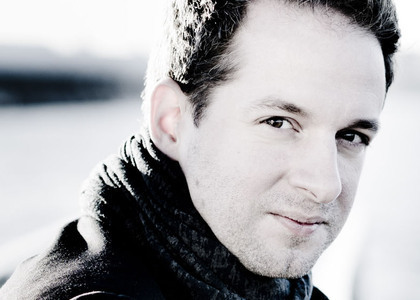> Vote for the classical album of 2016

Maurice Ravel's Integral piano works - an album broadcasted in premiere between the 24th and the 28th of October at CD Review from the Arpeggio show
If you would like to vote for this cd please vote HERE
My style of playing can be attributed to Ravel
At the age of 34, Bertrand Chamayou is an emergent French pianist, who holds the success from his previous recordings in his repertoire, referring to records that contain the works of Schubert, Liszt and the highly appreciated album dedicated to César Franck. But the Ravel challenge is at a higher level. And his album has been acclaimed by critics and audiencesalike. The music of Ravel is the area in which Chamayou feels most comfortable. He said: My style of playing, the way I imagine the sound of the piano, they can largely be attributed to Ravel. In fact, recording his music means returning to my roots but also taking a natural step in my artistic growth.
Ravel's Integral piano works
Not long ago Ravel's Integral piano works were very rare. The most relevant works are those recorded in the 50's by Walter Gieseking, Marcelle Meyer and Robert Casadesus, and in the 60's by Vlado Perlemuter and Monique Haas. Vlado Perlemuter was actually Ravel's student. An integral produced by Decca Records, signed by Jean - Yves Thibaudet in 1991, set a standard for the previous years. But lately, a great number of young pianists took it upon them to master Ravel's integral solo works, mentioning Alexandre Tharaud and Florian Uhlig.
Chamayou's Integral
The most recent discography of Ravel's integral piano works has Bertrand Chamayou's signature on it, a record under the Erato logo. Same logo under which the pianist launched the Schubert album in 2014, a record that, according to Sunday Times: is interpreted with intellectual certitude mixed with a tone so beautiful that will break your heart.
Schubert was one of the composers that inspired both Ravel - especially the Valses Nobles and Valses Sentimentales - and Franz Liszt, whose transcripts of Schubert's Lieder were part of Bertrand Chamayou's debut album. His influence is visible in Ravel's case, proving his unearthly virtuosity in the Gaspard de la nuit suite and the brilliant Jeux d'eau. The latter was the first modern work interpreted by Bernard Chamayou around the age of eleven or twelve. The pianist, if we may say so, has an indirect connection with Ravel through one of his teachers from the Paris Conservatory, Jean François Hessier. He was one of Vlado Perlemuter's students, who, in turn, had Ravel himself as a teacher, as mentioned before. Chamayou said: I admire the immaculacy and simplicity of Perlemuter's interpretation of Ravel's music, which can be correlated with the composer's famous statement: I don't expect people to interpret my music, but simply to play around with it.
In October 2013, Bertrand Chamayou performed a Ravel recital at Wingmore Hall in London. Heard International magazine wrote about the event: Chamayou brought a perfect blend of high quality virtuosity and sensibility. I have heard marvelous things.
Chamayou's Integral of Ravel's piano works is a collection that adds more interesting exceptions, such as the transcript of Kaddish, created by Ravel afterAlexander Siloti, and a sheet music by Alfredo Casella, "a la maniere de ... Ravel", along with Ravel parodies, after Boorodin and Chabrier.
Chamayou's technique is so well controlled that the artist easily transcends the difficulties of the transcripts and succeeds in fully focusing his attetion on colors, phrasing and accents. In comparison, the interpretation of German pianist Florian Uhlig is overwhelmed with virtuosity, and the one belonging to French musician Alexandre Tharaud appears too sensitive. Bertrand Chamayou is definitely a genuine poet of Ravel's music. Thus, the reason for chosing his album for "Vote 2016's classical music record" campain.
Do not miss this wonderful Ravel collection broadcasted for the first time at Radio România Muzical between the 24th and the 28th of October at CD Review. (12,15)
Translated by Ruxandra Vorotneac
MTTLC 1st year University of Bucharest














